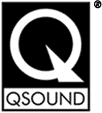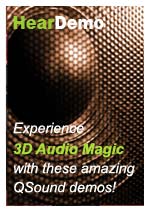Spotlight Feature
OpenSL ES™ 1.0 API for Advanced Audio Processing on Mobile Devices Released by Khronos Group
The Khronos Group, a member funded-industry consortium leading the development of open standard, royalty-free APIs for dynamic media on a variety of platforms and devices, has announced the public release of a provisional version of the OpenSL ES™ 1.0 specification designed to bring state-of-the-art audio to mobile devices. QSound Labs is pleased to have participated in the creation of this new standard over the past two years, along with AMD, Broadcom, Ericsson, Freescale, Nokia, Symbian, STMicroelectronics, Samsung, Texas Instruments and others.
OpenSL ES (Open Sound Library for Embedded Systems) is a cross-platform, hardware-accelerated audio API for 2D and 3D audio, standardizing access to features such as polyphonic ringtones, MIDI music playback and 3D positional audio. By providing a consistent interface to a wide variety of audio architectures on multiple operating systems, OpenSL ES will simplify the development of sophisticated audio-enabled applications. Diverse devices will now be able to implement a broad feature-set of audio functionality more easily including sampled audio, SP-MIDI, Mobile XMF, metadata extraction, equalization, MIDI messaging, 3D positional audio, reverberation and virtualization.
“The OpenSL ES specification represents the collaborative effort of key industry representatives to create a significant new audio standard,” said Dr. Nathan Charles, chair of the OpenSL ES working group.
"The goal is that this will become a widely accepted industry standard for developers to create more sophisticated audio content for mobile devices," said David Gallagher, President and CEO of QSound Labs.
"Since we have been on the working committee from the beginning, the architecture of our microQ audio engine already supports all of the functionality defined by the OpenSL ES specification. This now improves our ability to deliver the full power of microQ, (3D positional audio, quality MIDI playback and a full spectrum of audio effects) to the mobile device market."
With the release of OpenSL ES 1.0, Khronos expects that fragmentation of the audio API space will be reduced. Currently, audio silicon developers must support many high-level APIs of varying functionality directly on silicon. Even playing a simple sound on different platforms requires different code, rendering development cycles unnecessarily long and complex. OpenSL ES is a foundation-level, native API that will minimize this functional fragmentation and enable broad audio functionality for applications, high-level libraries or middleware. OpenSL ES is compatible with, and can provide acceleration for higher-level audio standards, including Java API JSR-234.
Khronos expects that OpenSL ES will be finalized by mid-2008 after integration of industry feedback. Multiple implementations of the new API are currently underway, with release of commercial devices using the new specification projected for 2008. It is expected that OpenSL ES, along with OpenMAX AL for media processing which was released simultaneously, will reach the same broad level of industry adoption as previously released Khronos specifications.

